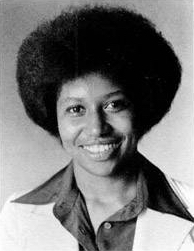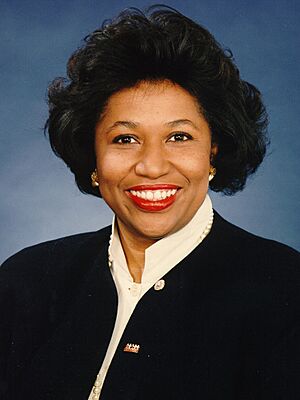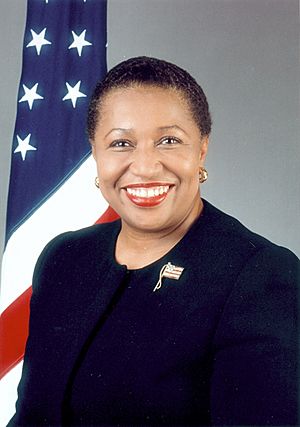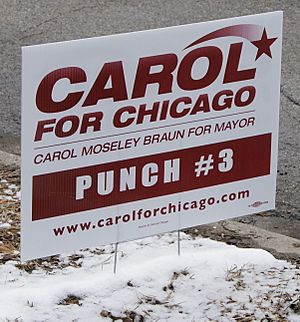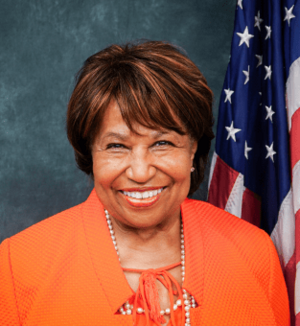Carol Moseley Braun facts for kids
Quick facts for kids
Carol Moseley Braun
|
|
|---|---|
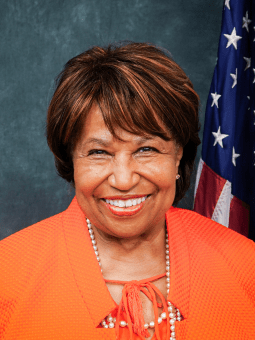
Official portrait, 2024
|
|
| Chair of the United States African Development Foundation | |
| Assumed office August 3, 2024 |
|
| President | Joe Biden Donald Trump |
| Preceded by | Jack Leslie |
| United States Ambassador to New Zealand | |
| In office December 15, 1999 – March 1, 2001 |
|
| President | Bill Clinton George W. Bush |
| Preceded by | Joe Beeman |
| Succeeded by | Charles Swindells |
| United States Ambassador to Samoa | |
| In office February 8, 2000 – March 1, 2001 |
|
| President | Bill Clinton George W. Bush |
| Preceded by | Joe Beeman |
| Succeeded by | Charles Swindells |
| United States Senator from Illinois |
|
| In office January 3, 1993 – January 3, 1999 |
|
| Preceded by | Alan Dixon |
| Succeeded by | Peter Fitzgerald |
| Cook County Recorder of Deeds | |
| In office December 1, 1988 – December 1, 1992 |
|
| Preceded by | Harry Yourell |
| Succeeded by | Jesse White |
| Member of the Illinois House of Representatives | |
| In office January 5, 1979 – December 1, 1988 |
|
| Preceded by | Robert E. Mann |
| Succeeded by | Donne Trotter |
| Constituency | 24th district (1979–1983) 25th district (1983–1988) |
| Personal details | |
| Born |
Carol Elizabeth Moseley
August 16, 1947 Chicago, Illinois, U.S. |
| Political party | Democratic |
| Spouse |
Michael Braun
(m. 1973; div. 1986) |
| Children | 1 |
| Education | University of Illinois, Urbana-Champaign (attended) University of Illinois at Chicago (BA) University of Chicago (JD) |
Carol Moseley Braun (born August 16, 1947) is an American diplomat, politician, and lawyer. She made history by representing Illinois in the United States Senate from 1993 to 1999. Moseley Braun was the first African-American woman ever elected to the U.S. Senate. She was also the first African-American U.S. senator from the Democratic Party. Additionally, she was the first female U.S. senator from Illinois.
Before her time in the Senate, Moseley Braun served in the Illinois House of Representatives from 1979 to 1988. She also worked as the Cook County Recorder of Deeds from 1988 to 1992. After her Senate term, she became the United States Ambassador to New Zealand and Samoa. In 2004, she ran for the Democratic nomination for president. More recently, in 2023, President Joe Biden nominated her to lead the United States African Development Foundation. She started this role in April 2024.
Contents
Early Life and Education
Carol Elizabeth Moseley was born in Chicago, Illinois. She attended public and Catholic schools during her childhood. She went to Ruggles School for elementary education. Later, she attended Parker High School in Chicago.
Her father, Joseph J. Moseley, was a police officer. Her mother, Edna A. (Davie), worked as a medical technician. Both her parents were Catholic, and she was raised in that faith.
Moseley Braun began her college studies at the University of Illinois at Urbana–Champaign. She later transferred to the University of Illinois at Chicago. There, she earned a Bachelor of Arts degree in political science in 1969. She then went on to earn a law degree (J.D.) from the University of Chicago Law School in 1972.
In 1973, Carol Moseley married Michael Braun. They had one son, Matthew, in 1977. Their marriage ended in 1986.
After law school, Moseley Braun worked as a prosecutor in Chicago from 1973 to 1977. She focused on civil and appellate law. Her work in areas like housing and environmental law earned her a special award from the Attorney General.
Early Political Career
Moseley Braun first entered public office in 1978. She was elected to the Illinois House of Representatives. In this role, she became the first African American woman to serve as an assistant majority leader. She was known for supporting important social causes. For example, she worked to stop the use of the death penalty in Illinois.
She also took legal action to ensure fair representation for African-American and Hispanic citizens. Her colleagues in the state legislature recognized her as "the conscience of the House." In 1988, she was elected Cook County Recorder of Deeds. She held this position for four years.
U.S. Senator from Illinois
Making History in the Senate
In 1992, Carol Moseley Braun decided to run for the U.S. Senate. She challenged the sitting Democratic Senator, Alan Dixon, in the primary election. She won the primary, surprising many.
On November 3, 1992, Moseley Braun achieved a historic victory. She became the first African American woman elected to the United States Senate. She was also the first woman from Illinois to serve in the U.S. Senate. Additionally, she was the first African American elected to the U.S. Senate as a Democrat.
Moseley Braun served one term in the Senate. She ran for re-election in 1998 but was defeated by Republican Peter Fitzgerald.
Key Moments and Contributions

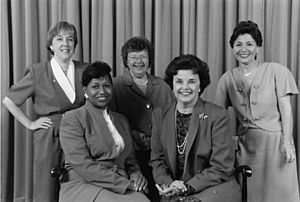
As a U.S. Senator, Carol Moseley Braun was the only African American in the Senate during her term. She was also the first woman to serve on the powerful Senate Finance Committee.
She was known for her liberal views on social issues. She supported gun control measures. She was also one of only fourteen senators to vote against the Defense of Marriage Act. On economic issues, she often took a more moderate approach. For example, she voted for the North American Free Trade Agreement (NAFTA).
In 1993, Moseley Braun played a key role in changing a Senate rule. Before then, women were not allowed to wear pants on the Senate floor. She and Senator Barbara Mikulski wore pants in defiance of the rule. Soon after, the rule was changed to allow women to wear pants with a jacket.
Another important moment came in 1993. Moseley Braun successfully argued against renewing a design patent for the United Daughters of the Confederacy. This patent included the Confederate flag. She spoke passionately about the flag's symbolism, saying it "has no place in our modern times." Her powerful speech convinced the Senate to reject the patent renewal.
U.S. Ambassador to New Zealand and Samoa
After her time in the Senate, President Bill Clinton nominated Moseley Braun for a new role. On October 8, 1999, she was chosen to be the United States Ambassador to New Zealand and Samoa. The Senate confirmed her nomination, and she served in these diplomatic roles until 2001.
2004 Presidential Campaign
In February 2003, Carol Moseley Braun announced her intention to run for president. She sought the Democratic Party's nomination. In her announcement, she said, "It's time to take the 'men only' sign off the White House door." She was the only major female candidate in the Democratic primaries that year.
Moseley Braun focused on issues like supporting a single-payer healthcare system. She also spoke out against the Iraq War and criticized the rising national budget deficit. She believed the U.S. should address the root causes of terrorism. She also called for increased funding for childcare and education.
She withdrew from the race on January 15, 2004. She then endorsed another candidate, Howard Dean.
2011 Campaign for Mayor of Chicago
In November 2010, after Chicago's mayor announced his retirement, Moseley Braun decided to run for mayor of Chicago. She was seen as a strong candidate, especially among African-American voters.
As a candidate, Moseley Braun emphasized her government experience. She also highlighted her connections to Chicago's black community. She finished fourth in the election on February 22, 2011.
Later Political Activities
Moseley Braun has continued to be involved in politics. She has endorsed various candidates in different elections. For example, she supported Donna Edwards in a 2016 Senate primary. She also endorsed Toni Preckwinkle and Brandon Johnson in Chicago mayoral runoffs.
In the 2020 Democratic Party presidential primaries, Moseley Braun endorsed Joe Biden. She campaigned for him in several states. At the 2020 Democratic National Convention, she announced Illinois' votes. After Biden won, she expressed interest in serving in his administration. She later supported Kamala Harris for president in the 2024 United States presidential election.
United States African Development Foundation
In January 2023, President Biden nominated Moseley Braun for an important role. She was chosen to be a member and chair of the board of directors for the United States African Development Foundation. Her nomination was confirmed in March 2024. She began her term as board member and chair in April 2024. Her term on the board will continue until September 22, 2029.
Work Outside Government and Politics
In 2005, Moseley Braun started an organic products company called Good Food Organics. She also became a visiting professor of political science at Northwestern University in November 2016. In April 2025, she was elected Board Chair of the DuSable Museum in Chicago.
Moseley Braun has also written a book. Her memoir, Trailblazer: Perseverance in Life and Politics, is scheduled to be published on January 21, 2026.
See also
 In Spanish: Carol Moseley Braun para niños
In Spanish: Carol Moseley Braun para niños
- Black women in American politics
- List of African-American United States senators
- List of African-American United States Senate candidates
- Women in the United States Senate
 | Mary Eliza Mahoney |
 | Susie King Taylor |
 | Ida Gray |
 | Eliza Ann Grier |


